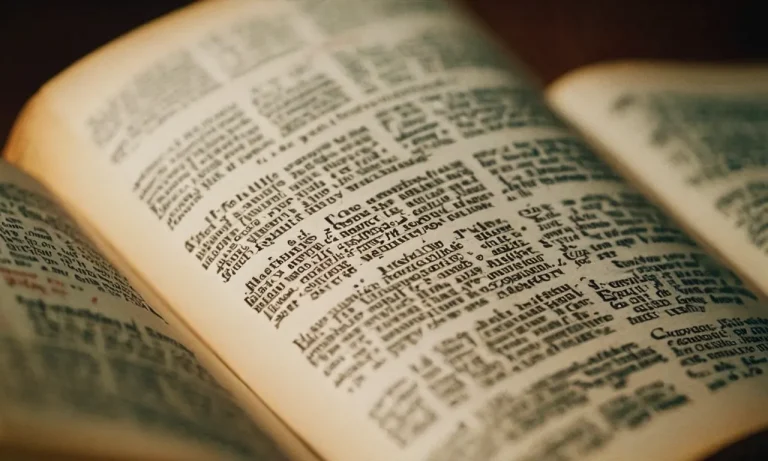Is There A True Original Book From God That Hasn’T Changed?
The question of whether there is one true, original, and unchanged book directly from God is one that has been pondered by religious scholars and theologians for centuries. In this comprehensive article, we will examine the evidence and arguments surrounding this complex theological issue.
If you’re short on time, here’s a quick answer to your question: While many religions believe their sacred texts come directly from God, most mainstream religious scholars agree that all ancient religious texts have been changed to some degree over time.
There is no consensus on one single text being the unchanged ‘true original’ direct from God.
Examining Major Religious Texts and Claims of Divine Origin
The Bible and its Multiple Authors, Translations, and Versions
The Bible is a collection of texts written by over 40 authors over a period of 1500 years. It has gone through countless translations and revisions, with major versions including the Jewish Tanakh, the Catholic Bible, Protestant Bibles like the King James Version, and more modern translations.
This complexity around authorship and translations means there are many differences in wording and passages across Bible versions. Some view this as showing the texts have evolved over time and call into question beliefs around biblical inerrancy or it being the direct word of God.
Others feel divine inspiration still shines through, despite human limitations in transmitting the message.
The Quran and its Verbal Revelation to Muhammad
Muslims believe the Quran was verbally revealed to the prophet Muhammad between 610-632 AD by the angel Gabriel. It is written in classical Arabic, which has not changed dramatically over time. Most Muslims treat the Quran as the direct word of God.
However, variations in recitation and rare alternate readings are known to exist. There is also ongoing debate around the order chapters should go in. Yet overall, the Quran has remained very stable over 1400 years compared to other faith texts.
The Vedas and their Origins in Hindu Cosmology
Hinduism considers the Vedas as shruti – revealed scriptures heard by ancient sages in deep states of meditation. They are dated from as early as 1500 BC and believed to convey fundamental truths of reality. However, the origins are mystical and there is no single historical author.
Given their age, the Vedas have been passed down orally over generations before being written down. This has created ample opportunity for changes to creep in. Many schools of Hinduism also focus on other later texts like the Upanishads or Bhagavad Gita, diminishing how central the Vedas are today.
Historical Evidence of Changes and Alterations
The Bible’s Extensive Historical Revisions
The Bible is considered by many to be the direct word of God. However, extensive revisions over thousands of years call this assumption into question. The Old Testament alone was edited and revised for over 1,000 years before the canon was finalized around 100 AD.
Since then, various translations have changed word meanings and restructured passages. For example, the King James Version purposefully modified earlier translations to reinforce Church authority and downplay divine inspiration.
So while the Bible offers profound wisdom, it’s debateable whether the current text matches the “true original” version.
Variations Between Quranic Manuscripts
The Quran is revered by Muslims as the literal word of God dictated to the Prophet Muhammad. However, variations exist between early Quranic manuscripts. For example, the Sanaa manuscript, discovered in Yemen in 1972 and dated to the 7th-8th centuries AD, contains different verse orderings and numerous textual variants compared to today’s Quran.
Did God change his mind on the order of verses? Probably not! More likely, human transmission errors crept in over time. While the main messages are consistent, it seems implausible that the exact word-by-word text Muslims read today matches the “true original” 7th century manuscript.
Lack of Original Vedic Source Material
Hindus consider the Vedas as shruti – revealed scriptures heard by ancient sages. But the original oral texts were not formally written down until centuries later. The oldest surviving Vedic manuscript dates to only the 11th century AD.
Experts estimate the texts were edited, revised, and expanded over hundreds of years before being fixed in writing. So while the essence remains, the exact wording of the original Vedic revelations has been lost in the mists of time.
Later written compilations inevitably include human modifications and additions. Like other scriptures, discovering an unchanged “true original” Veda is likely impossible.
Theological Perspectives on Divine Revelation
Literalist Views: The Word of God Must Be Perfect
Many religious traditions hold a literalist view that scriptures are the direct and perfect word of God. Biblical literalists believe that the Bible is without error and must be interpreted precisely as written.
They view the scriptures as divine revelation, with every word being inspired and dictated by God.
Contextualist Views: Divine Truth Expressed Through Culture/Language
In contrast to literalists, contextualists argue that scriptures reflect both divine inspiration and human limits. They highlight that divine truth comes to people embedded in various historical-cultural contexts.
As such, contextualists allow for scriptural inspiration without demanding absolute textual perfection.
Metaphorical Views: Scriptures as Inspired, Not Dictated
Metaphorical perspectives on scripture also emphasize that divine truth comes through human vessels. They view the scriptures as inspired by God but not directly dictated. As such, they allow scriptural authority to coexist with metaphorical language, factual inconsistencies, and human imperfections.
| Metaphorical View | Literalist View |
| Sees Scripture as inspired by God | Sees Scripture as directly dictated by God |
| Allows for metaphorical language | Reads all passages literally |
| Accepts minor inconsistencies | Demands absolute perfection |
Conclusion
In summary, while most major religions believe their sacred texts originated from divine revelation, academic analysis reveals that all ancient religious texts show evidence of human authorship, editing, and alteration over time.
There is no scholarly consensus pointing to one unchanged ‘true original’ text. The debate continues, with some arguing the search itself is futile, while others insist that gleaning divine truths requires looking at the deeper meanings behind the words.
This article has examined the key evidence and viewpoints regarding whether an original book from God exists. We’ve seen the theological and historical complexities underlying this issue. While a definitive conclusion remains elusive, the discussion itself can lead to greater understanding between different faiths and their sacred texts.








